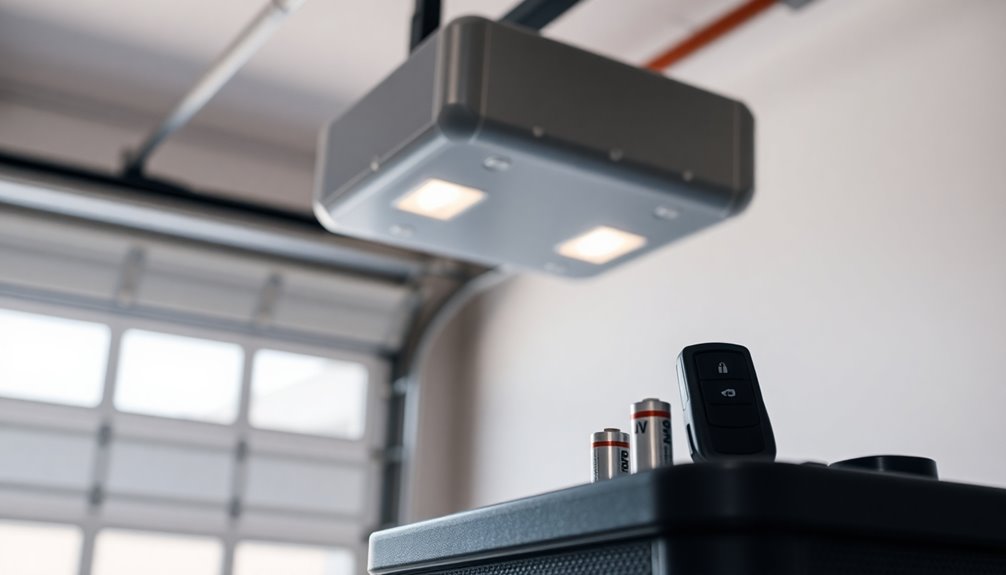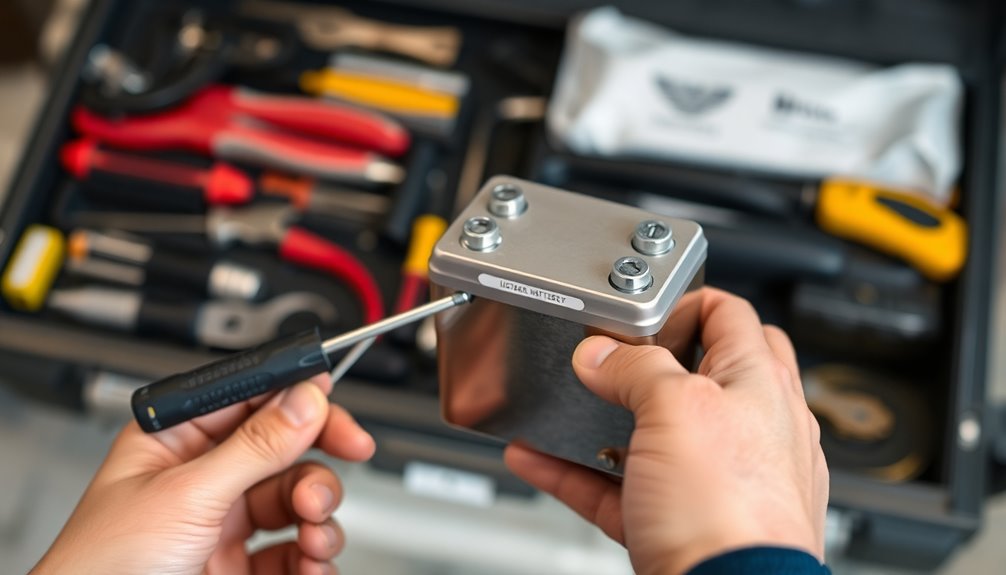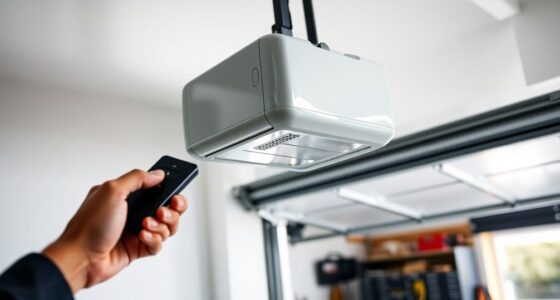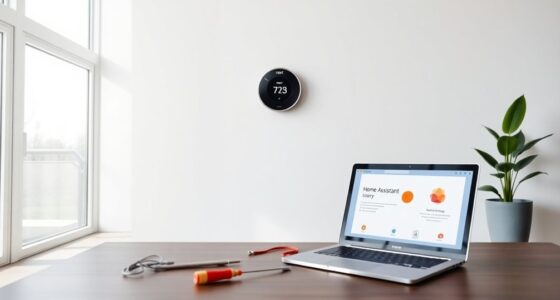Garage door openers usually use button cell batteries, specifically CR2032 or CR2450. It’s important to check your owner’s manual for the exact battery size, as using the wrong type can lead to performance issues. To find out for sure, you can open the transmitter and check the battery compartment. When replacing the battery, make sure to note the orientation of the old one. Regularly inspect battery health, as lifespan varies from 1 to 5 years. If you’re curious about installation tips and maintenance, there’s plenty more you can explore to keep your opener running smoothly. Additionally, if you have a Hyundai Tucson, you can easily integrate your garage door opener with your vehicle’s system for added convenience. The Hyundai Tucson garage door opener setup typically involves programming the car’s built-in buttons to sync with your garage door remote. This streamlines access to your garage, ensuring you never have to fumble for a separate remote again. Remember to consult both your vehicle and garage door opener manuals for specific instructions on this setup process.
Key Takeaways
- Most garage door openers use button cell batteries, commonly CR2032 or CR2450, for remote controls.
- Check the owner's manual for the specific battery size required for your garage door opener.
- To confirm battery size, open the transmitter and inspect the existing battery for its code.
- Replace batteries every 1 to 5 years, depending on type and usage frequency.
- Follow proper installation guidelines to ensure optimal performance and avoid damage.
Battery Types for Garage Door Openers

When you're choosing a battery for your garage door opener, it's important to know the different types available. The most common battery types used are lithium, alkaline, and lead-acid.
Lithium batteries are often preferred for their longer lifespan and consistent performance, lasting about five years. Alkaline batteries, on the other hand, typically last up to three years and are widely used in many applications.
For your garage door opener remote, you might also encounter button cell batteries like CR2032 and CR2450, which provide compact power for low-energy needs.
Selecting the correct battery is crucial, as using the wrong type can lead to performance issues or even damage to your garage door opener. Regular maintenance will keep everything running smoothly.
Identifying Battery Size

How can you ensure you're using the right battery size for your garage door opener? Start by checking the owner's manual, where you'll typically find the specified battery type.
Most remotes require button cell batteries like CR2032 or CR2450, identifiable by their three to four-digit numbers. If the manual isn't handy, look on the back of your remote for the battery size.
Different brands and models may need different battery sizes, so it's crucial to consult a chart that lists these sizes accurately. If you're still unsure, you might need to open the transmitter to see the exact remote battery type.
This way, you can ensure your garage door opener operates smoothly and reliably.
Installation and Replacement Process

To ensure a smooth battery replacement for your garage door opener, start by disconnecting the power supply to avoid any electrical hazards.
Next, locate the battery compartment, usually found on the back of the opener. Use a Phillips head screwdriver to open it.
Carefully remove the old battery, taking note of its orientation, and insert the new battery securely, ensuring it matches the specified battery type in the manufacturer's guidelines.
Once you've finished replacing the battery, securely replace the cover and reconnect the power supply.
Finally, test the garage door opener for functionality.
If you're unsure about replacing the battery in your garage or encounter complex systems, consider hiring a professional for proper installation.
Maintenance Tips

Maintaining your garage door opener is essential for optimal performance and longevity. Regularly check the battery health of your remote, as most batteries last between 1 to 5 years, depending on the types of batteries used.
Clean the battery terminals periodically to eliminate corrosion, ensuring a good connection and extending the battery's lifespan. Store replacement batteries at room temperature, away from direct sunlight, to maximize their performance.
Always follow the manufacturer's guidelines for battery replacement, using the correct size, like CR2032 for many remotes. Additionally, ensure proper airflow around the unit to enhance performance, just as with air purifier maintenance(#).
Finally, dispose of old batteries responsibly by adhering to local regulations to minimize environmental impact and prevent hazards.
These maintenance tips will keep your garage door opener running smoothly for years to come.
Cost Considerations

While considering the costs associated with garage door opener batteries, it's important to factor in both the price of the batteries themselves and any potential installation fees.
Typically, a garage door opener battery ranges from $15 to $50, depending on the type and brand you choose. If you opt for professional installation, you might face additional costs of $50 to $100.
However, investing in high-quality batteries can save you money in the long run by reducing replacement frequency due to their superior durability. Additionally, some batteries come with warranties, providing extra peace of mind.
Remember to budget for regular maintenance and unexpected replacements to manage your overall cost considerations effectively.
Frequently Asked Questions
What Size Battery Is in My Garage Door Opener?
To find out what size battery's in your garage door opener, check the remote's back or consult the owner's manual.
You'll typically need a small circular lithium battery like a CR2032 or CR2450, but it can vary. If you're unsure, take the old battery to a store for matching.
Remember, it's essential to replace it with the exact size and voltage to keep your opener functioning properly.
Don't hesitate to seek help if needed!
What Kind of Battery Does a Clicker Garage Door Opener Take?
Finding the right battery for your Clicker garage door opener is like searching for a needle in a haystack.
You'll typically need a button cell battery, often a CR2032, CR2025, or CR1616, depending on your model.
Check the back of your remote or consult the owner's manual for specifics.
Make sure to replace it with the same size and voltage to keep everything running smoothly and avoid any operational hiccups.
Do All Garage Door Openers Use the Same Battery?
No, not all garage door openers use the same battery. Different brands and models require various battery types, like AA, AAA, or specific lithium button cells.
You'll often find that even within the same brand, the battery can differ. To ensure you're using the right battery, check your owner's manual or the manufacturer's specifications.
Regularly examining your battery's compatibility is essential for keeping your garage door opener functioning properly.
What Battery Does My Garage Remote Take?
To find out what battery your garage remote takes, check the back of the remote for the identification number.
Most likely, it'll be a button cell battery, such as CR2032, CR2025, or CR2016. The CR2032 is the most common.
If you're unsure, consult the owner's manual or the manufacturer's website for specifics.
Replacing it's usually straightforward, but some remotes might need basic tools to open the casing.
Conclusion
In conclusion, knowing the right battery size for your garage door opener is like having a key to a treasure chest! You wouldn't want to be stuck in your driveway, battling the elements while your door refuses to budge. So, grab that battery size and keep your opener humming like a well-oiled machine. With proper maintenance, you'll ensure your garage door operates smoother than a hot knife through butter, ready to serve you at a moment's notice!









